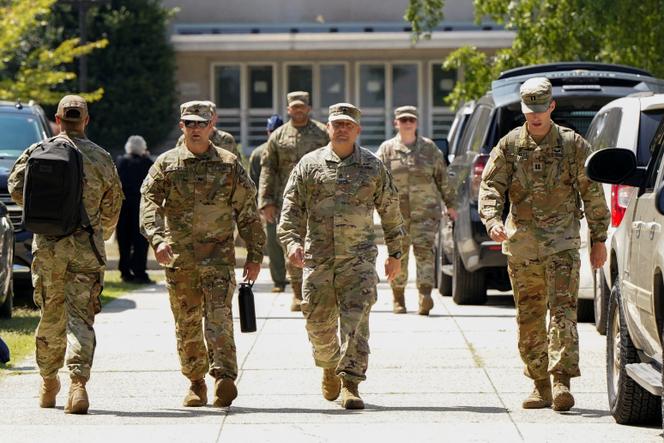


The new picture of law enforcement in the nation's capital began taking shape Tuesday, August 12, as some of the 850 National Guard members deployed by the Trump administration began arriving as police and federal officials took the first steps in an uneasy partnership to reduce crime in what President Donald Trump called – without substantiation – a lawless city.
The influx came the morning after the Republican president announced he would be activating the guard members and taking over the District's police department. He cited a crime emergency – but referred to the same crime that city officials stress is already falling noticeably. The president holds the legal right to make such moves, at least for a month.
Mayor Muriel Bowser pledged to work alongside the federal officials Trump has tasked with overseeing the city's law enforcement, while insisting the police chief remained in charge of the department and its officers.
"How we got here or what we think about the circumstances – right now we have more police, and we want to make sure we use them," she told reporters.
The tone was a shift from the day before, when Bowser said Trump's plan to take over the Metropolitan Police Department and call in the National Guard was not a productive step and argued his perceived state of emergency simply doesn't match the declining crime numbers. Still, the law gives the federal government more sway over the capital city than in US states, and Bowser said her administration's ability to push back is limited.
The law allows Trump to take over the DC police for up to 30 days, though White House press secretary Karoline Leavitt suggested it could last longer as they "reevaluate and reassess" following the month-long period. Extending federal control past that time would require Congressional approval, something likely tough to achieve in the face of Democratic resistance.
About 850 federal law enforcement officers were deployed in Washington on Monday and arrested 23 people overnight, Leavitt said. The charges, she said, included gun and drug crimes, drunk driving, subway fare evasion and homicide.
The US Park Police has also removed 70 homeless encampments. People who were living in them can leave, go to a homeless shelter or go into drug addiction treatment, Leavitt said. Those who refuse could face fines or jail time.
While Trump invokes his plan by saying that "we're going to take our capital back," Bowser and the MPD maintain that violent crime overall in Washington has decreased to a 30-year low after a sharp rise in 2023. Carjackings, for example, dropped about 50% in 2024 and are down again this year. More than half of those arrested, however, are juveniles, and the extent of those punishments is a point of contention for the Trump administration.
Trump is the first president to use the law's Section 740 to take over Washington's police for up to 30 days during times of emergencies.
For Trump, the effort to take over public safety in DC reflects an escalation of his aggressive approach to law enforcement. The District of Columbia's status as a congressionally established federal district gives him a unique opportunity to push his tough-on-crime agenda, though he has not proposed solutions to the root causes of homelessness or crime.
